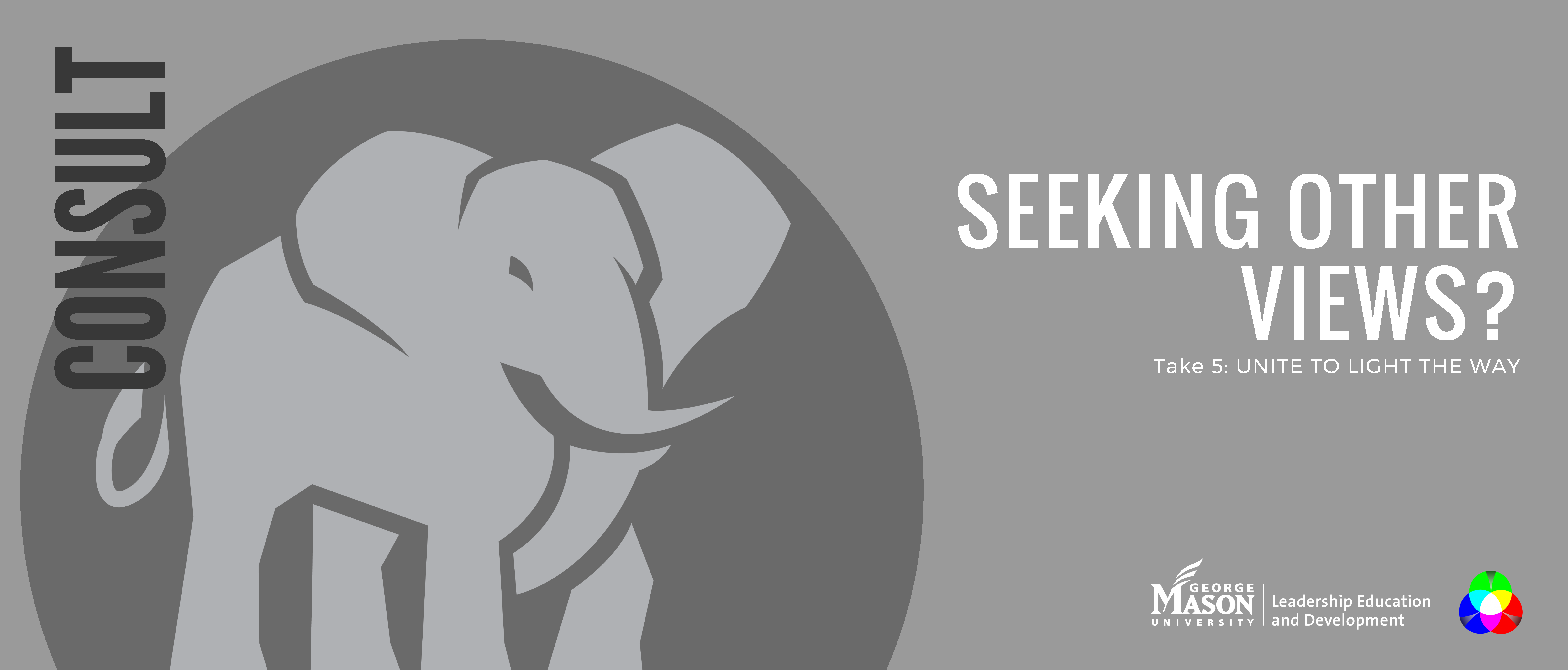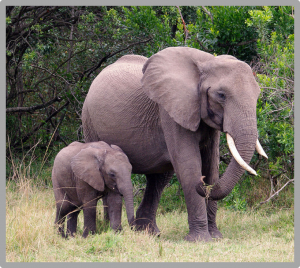ELLY the ELEPHANT. Focus Color: GREY (SILVER)
Why read the information below?
1. Have a tough decision to make? Explore the strengths and challenges of this decision-making focus.
2. Discover the benefits of uniting different focus areas (colors/animals).
3. Practically apply these resources to make better decisions individually, and in groups. For example: use the FREE Take5 card (take5.gmu.edu/ethics-card), request a workshop (email: [email protected]), etc.
Why an Elephant?
Elly, like many elephants, is known for being intelligent and having a great memory. Elephants are also know to look out for one another. Elly and people who prefer the Consult Focus value consulting with others to come to the best possible solutions. The “elephant in the room” (i.e., obvious problem that we often do not want to talk about) is that we each need to consult with others in order to consider different perspectives and counteract our harmful biases.
Why the color Grey/Silver?
There are 3 primary colors of light: green, red, and blue. Imagine that we have 3 flashlights that we shine in a dark room: one is green, one is red, and one is blue. If we overlap low levels of green, red and blue light, we get dark grey light. If we overlap medium levels of green, red and blue light, we get medium grey light. The Consult focus (Grey/Silver) may be seen as a combination of aspects of the Character focus (Green Otter), Code focus (Red Hawk), and Consequences focus (Blue Wolf), since consulting with others can include ideas from all 3 primary focus areas. Furthermore, consulting with others can clarify, or muddy, various perspectives and can either help us move towards the full spectrum of light, or further away from it. Wise and trusted advisors can help us to see important subtleties that we may miss on our own. However, we may choose to consult with people who have harmful biases of their own, which can cloud our own judgement.
Main Consideration:
When deciding what’s right, Elly and others with a Consult Focus tend to focus on CONSULTing with others to get different perspectives and to avoid harmful biases.
Question:
Like Elly, someone with a Consult Focus may ask themselves: “Who will help me consider different perspectives and avoid harmful biases?” They believe in recognizing and challenging their own biases, which we all have.
Strengths of the Consult Focus:
1. OTHER PERSPECTIVES. A friend tells you about the death of a close family member of theirs. You plan to go see your friend, but you’re not sure what to say. You decide to comfort your friend by saying “everything happens for a reason” & “they’re in a better place now.” However, after consulting with another friend, you realize that these statements can be hurtful to someone who is grieving (e.g., they may feel you’re being dismissive and that the “better place” for their family member is to still be here with them). A strength of the CONSULT focus is that by consulting with others we can learn from their perspectives and better understand different viewpoints.
2. COUNTERACT BIASES. Imagine that you need to help select someone for a job in your organization. Your very good friend really wants the job, and you convince yourself that you can be an objective part of the selection process. You consult with another friend and realize that you were actually fooling yourself; your decision would have been biased. The friend that you are consulting with also helps you to uncover some unfair assumptions (based on biases you have) that you have made about one of the applicants based on their name and personal background. A strength of the Consult focus is that it reminds us to consult with others who are trustworthy so that we can become more aware of our own harmful biases, and self-deception. By understanding that we are all biased in some way, and focusing on different viewpoints, we can see things from different angles and work to counteract our harmful biases.
Challenges of the Consult Focus:
1. OTHERS’ BIASES. Imagine that you are part of a group that must decide on how to distribute a limited amount of funding to various offices or organizations in a fair/just way. You decide to consult with a friend/mentor. You do not realize this friend/mentor has negative feelings about certain groups of people (e.g., people with disabilities, people from certain religious and/or political groups, etc.). We must be very careful about who we consult with, since others have harmful biases as well. It can help if we consult with those who have consistently proven that they incorporate well-respected principles that have stood the test of time in the field of Moral Philosophy (e.g. Otter’s Character, Hawk’s Code, Wolf’s Consequences Focus, and Bear’s Care).
2. IMPLEMENTATION. Imagine that you have time to consult with three trusted friends/mentors about how to distribute funding for various organizations in a fair way. The 1st says “Split the funds equally across the 5 organizations”. The 2nd says “Give at least some funding to all 5 organizations, but more to organizations A and B, since they have had less support in the past.” The 3rd says “Give more to those who have worked the hardest.” How many perspectives should we consider and what happens when they conflict? There are no easy answers, but it can help if we consult with those who have consistently proven that they incorporate well-respected principles that have stood the test of time in the field of Moral Philosophy (e.g., Otter’s Character, Hawk’s Code, Wolf’s Consequences Focus, and Bear’s Care).
Theoretical Background:
Behavioral Ethics, Behavioral Economics and the Psychology of Decision Making (based on the wisdom of Nobel Prize winner Daniel Kahneman and others).
Conclusion:
Elly the Elephant represents a very important and respected focus area (CONSULT). However, it does not include everything. To balance out the challenges above, the Elephant CONSULTant focus area should be used in combination with other focus areas like Bear’s CARE. Combining focus areas is called PLURALISM and can be very beneficial.
Next Steps:
1. Remind yourself of the strengths and challenges of your main focus animal/color. This can help you anticipate benefits and identify potential problems down the road. For example, if someone only focuses on the Golden Rule: “How can I treat others how I/they would like to be treated?” (Bear’s Care focus) they may not hold someone accountable for their behavior because they would not want to be held accountable if they were in the other person’s situation, leading to a lack of fairness/justice.
2. Pick at least one other focus area (another animal/color) to read more about (see take5.gmu.edu/animals/). This can help you to better understand the strengths and challenges of different decision-making strategies. It can also help you to see the benefits of uniting the focus areas, since the different focus areas can build off of one another’s strengths and counteract one another’s challenges. This is why we say “Unite to light the way.”
3. Use the Take5 card (take5.gmu.edu/ethics-card/) to help you make well-balanced decisions (individually, and in groups). This card is practical, and action focused. Print it out or email [email protected] to request a card. Research shows that we all need reminders to make more ethical decisions.
4. Request a workshop. Email [email protected] to request a workshop to better understand these ideas and resources.
Handout:
To better understand this focus area, see the PDF Handout.
Overall Conclusion about the focus areas of the animals:
The Otter, Hawk, Wolf, Bear and Elephant represent very respected views from moral philosophy. We recommend combining the views of these 5 animals to balance out their strengths and weaknesses. For some tips on how to do this, please see the ethicspectrum page.
For George Mason University community members who would like to learn more, the Center for Leadership and Intercultural Engagement (CLIE) offers workshops and other programs on ethics and leadership topics. The workshop that directly addresses the ethics and leadership topics discussed on this website is called: “What Would You Do? Making Tough Ethical Choices.” Please see our general page at lead.gmu.edu or our workshop request page.



